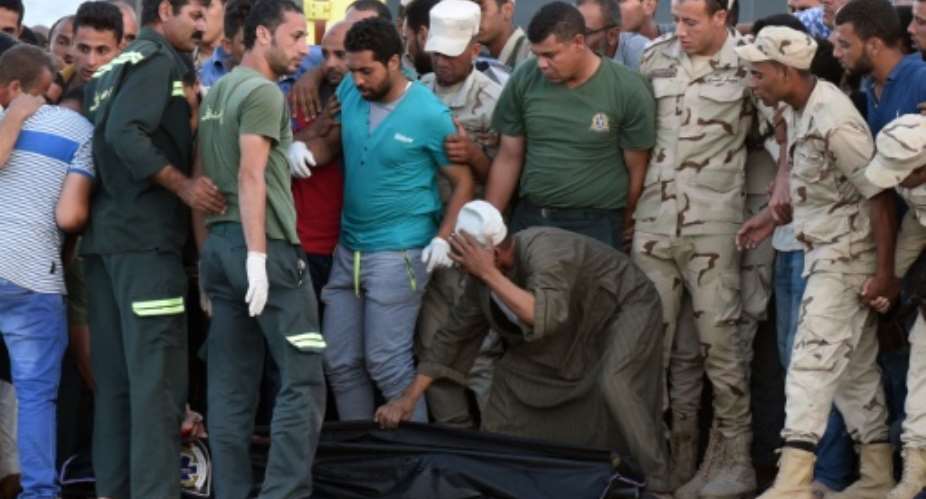Cairo (AFP) - Egyptian rescue workers have recovered 168 bodies from a migrant shipwreck off Egypt's Mediterranean coast, the health ministry said Sunday.
Survivors have said up to 450 migrants were on board the overcrowded fishing vessel headed to Italy from Egypt when it keeled over Wednesday off the port city of Rosetta.
Egypt's military has said it rescued 163 survivors and that recovery attempts were continuing.
The International Organization for Migration said most of those rescued were Egyptians but they also included Sudanese, Eritreans, a Syrian and an Ethiopian.
The tragedy sparked an emergency cabinet meeting and also topped the agenda of talks between President Abdel Fattah al-Sisi and Egypt's security chiefs on Saturday.
Prime Minister Sherif Ismail ordered heightened patrols of harbours used by migrant boats and of the northern coastline.
A new bill being submitted to parliament would include "deterrent penalties" against people smugglers.
Egyptian authorities have so far in 2016 foiled 110 attempts to smuggle migrants to Europe, Interior Minister Magdy Abdel Ghaffar told the cabinet.
The UN refugee agency expects 2016 to be the deadliest year on record for Mediterranean crossings by migrants.
More than 4,600 non-Egyptians, many of them Sudanese and Ethiopians, have been arrested this year trying to depart from Egypt's northern coast, the UNHCR said Friday.
More than 10,000 people have died attempting to cross the Mediterranean to Europe since 2014, according to the United Nations.





 Chief arrested for killing soldier at Kasoa over land
Chief arrested for killing soldier at Kasoa over land
 GAF probes soldier’s murder at Kasoa Millenium City
GAF probes soldier’s murder at Kasoa Millenium City
 Ghana steps up effort to pass new Labour law
Ghana steps up effort to pass new Labour law
 AG advises EOCO against money laundering probe into Cecilia Abena Dapaah’s affai...
AG advises EOCO against money laundering probe into Cecilia Abena Dapaah’s affai...
 May Day: I'll prioritise welfare of workers, abolish compulsory retirement age a...
May Day: I'll prioritise welfare of workers, abolish compulsory retirement age a...
 V/R: Adaklu-Tevikpo murder suspect arrested from hideout
V/R: Adaklu-Tevikpo murder suspect arrested from hideout
 Kasoa: Soldier killed by alleged land guards over land dispute — GAF
Kasoa: Soldier killed by alleged land guards over land dispute — GAF
 Fatal shooting of soldier happened at Gomoa East not Kasoa; stop tarnishing our ...
Fatal shooting of soldier happened at Gomoa East not Kasoa; stop tarnishing our ...
 ‘We condemn unprovoked attack in no uncertain terms’ — GAF on fatal shooting of ...
‘We condemn unprovoked attack in no uncertain terms’ — GAF on fatal shooting of ...
 Ghanaians urged to ensure violence free elections on December 7
Ghanaians urged to ensure violence free elections on December 7
